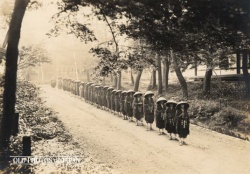Difference between revisions of "Ajari"
Jump to navigation
Jump to search
| (6 intermediate revisions by 2 users not shown) | |||
| Line 1: | Line 1: | ||
[[File:355.jpg|thumb|250px|]] | [[File:355.jpg|thumb|250px|]] | ||
| − | Ajari is a Japanese term that is used in various schools of Buddhism in Japan, specifically Tendai and Shingon, in reference to a "senior | + | |
| + | |||
| + | |||
| + | |||
| + | |||
| + | |||
| + | |||
| + | [[Ajari]] is a [[Japanese]] term that is used in various [[schools of Buddhism]] in [[Japan]], specifically [[Tendai]] and [[Shingon]], in reference to a "{{Wiki|senior}} [[Monk]] who teaches students; often abbreviated to jari. The term is a [[Japanese]] rendering of the {{Wiki|Chinese}} transliteration for the [[Sanskrit]] "âcârya," one who [[knows]] and teaches the {{Wiki|rules}}." In the [[Sōtō]] [[tradition]], this title is used in reference to any [[Monk]] that has completed five [[Ango]]—a way of demonstrating [[respect]] and reverence for them. | ||
{{W}} | {{W}} | ||
| − | [[Category:Zen | + | [[Category:Zen terminology]] |
[[Category:Buddhist Terms]] | [[Category:Buddhist Terms]] | ||
[[Category:Japan]] | [[Category:Japan]] | ||
[[Category:Buddhist Titles]] | [[Category:Buddhist Titles]] | ||
| + | {{JapaneseTerminology}} | ||
Latest revision as of 08:23, 22 December 2023
Ajari is a Japanese term that is used in various schools of Buddhism in Japan, specifically Tendai and Shingon, in reference to a "senior Monk who teaches students; often abbreviated to jari. The term is a Japanese rendering of the Chinese transliteration for the Sanskrit "âcârya," one who knows and teaches the rules." In the Sōtō tradition, this title is used in reference to any Monk that has completed five Ango—a way of demonstrating respect and reverence for them.
